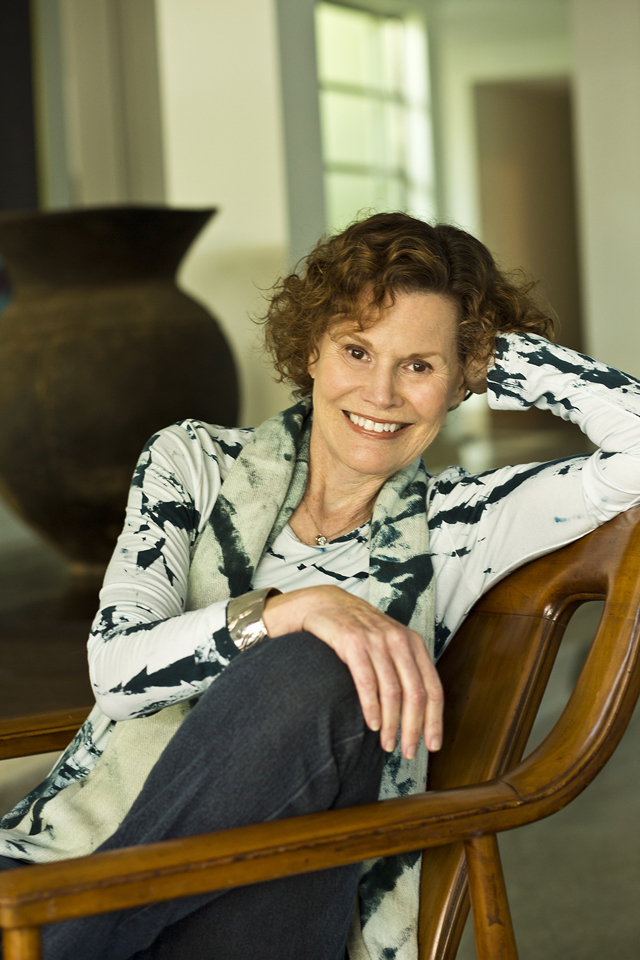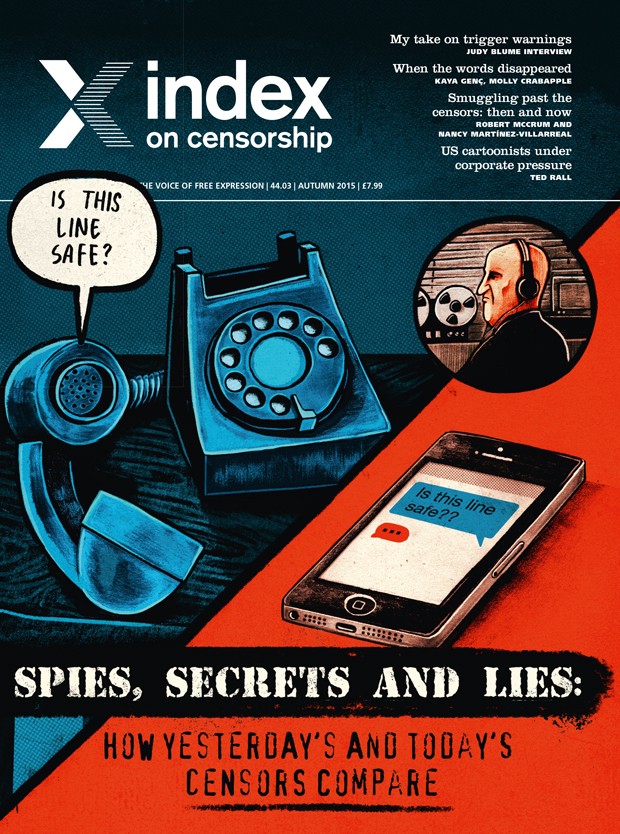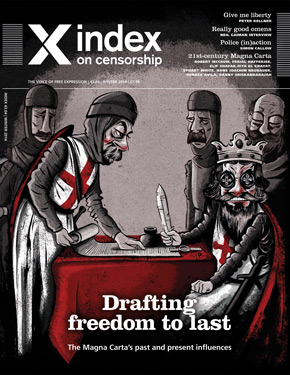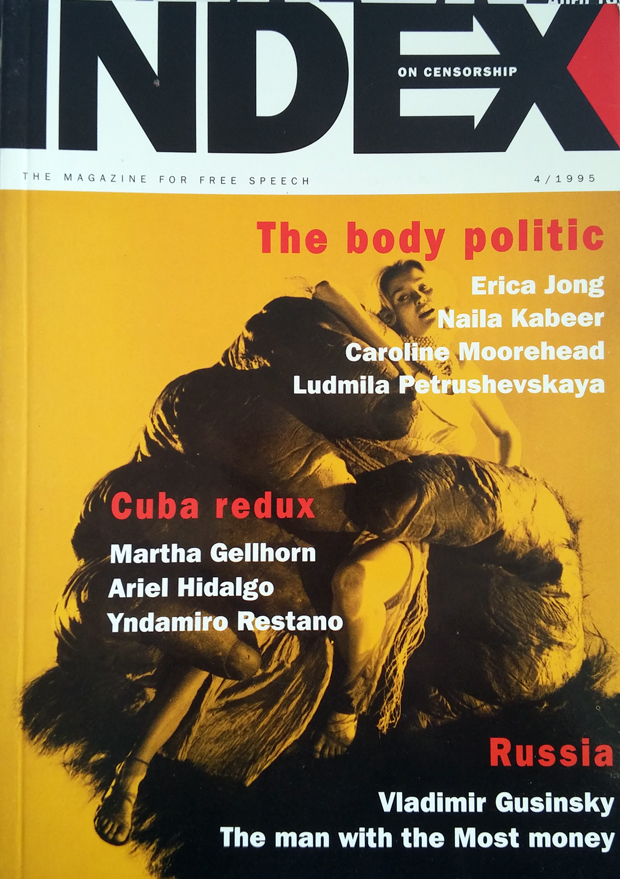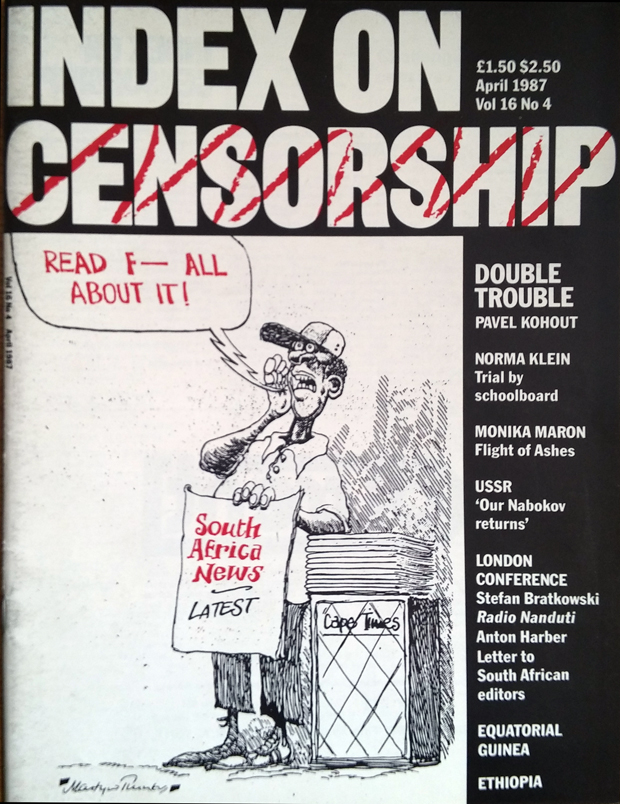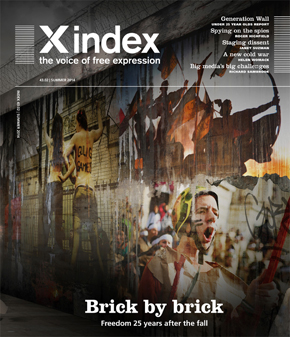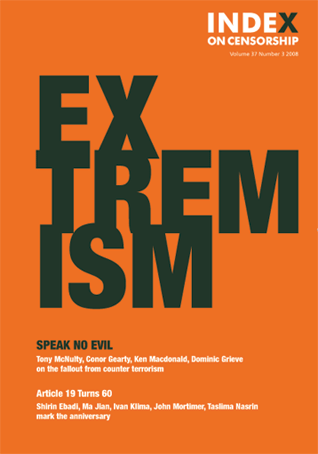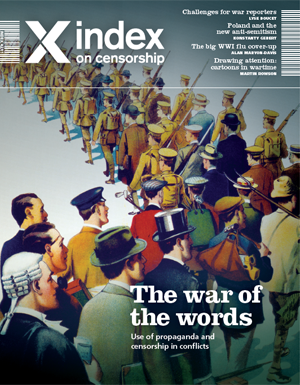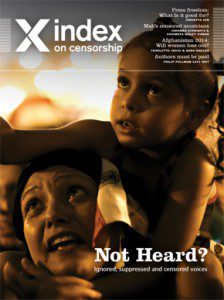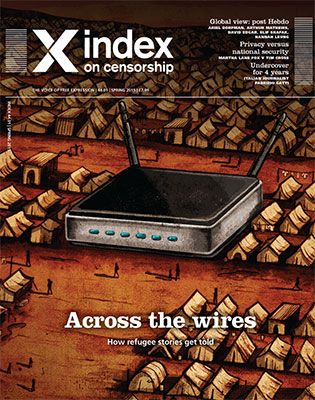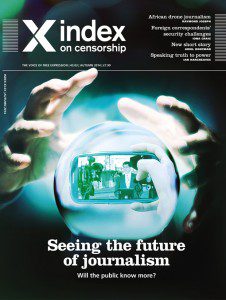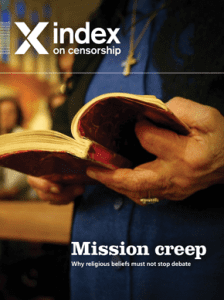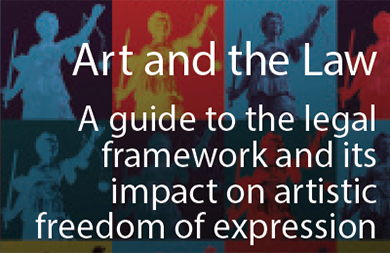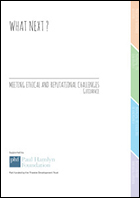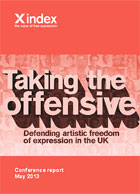21 Jul 2015
Preface
Freedom of expression is essential to the arts. But the laws and practices that protect and nurture free expression are often poorly understood both by practitioners and by those enforcing the law. The law itself is often contradictory, and even the rights that underpin the laws are fraught with qualifications that can potentially undermine artistic free expression.
As indicated in these packs, and illustrated by the online case studies – available at indexoncensorship.org/artandoffence – there is scope to develop greater understanding of the ways in which artists and arts organisations can navigate the complexity of the law, and when and how to work with the police. We aim to put into context the constraints implicit in the European Convention on Human Rights and so address unnecessary censorship and self-censorship.
Censorship of the arts in the UK results from a wide range of competing interests – public safety and public order, religious sensibilities and corporate interests. All too often these constraints are imposed without clear guidance or legal basis.
These law packs are the result of an earlier study by Index: Taking the Offensive, which showed how selfcensorship manifests itself in arts organisations and institutions. The causes of self-censorship ranged from the fear of causing offence, losing financial support, hostile public reaction or media storm, police intervention, prejudice, managing diversity and the impact of risk aversion. Many participants in our study said that a lack of knowledge around legal limits contributed to self-censorship.
These packs are intended to tackle that lack of knowledge. We intend them as “living” documents, to be enhanced and developed in partnership with
arts groups so that artistic freedom is nurtured and nourished.
Jodie Ginsberg, chief executive, Index on Censorship
Foreword by Brett Rogers
I was surprised when I arrived at The Photographers’ Gallery in 2005 to discover there had never been a solo show of US photographer Sally Mann in
the UK. So when I saw the touring exhibition, The Family and The Land, in Amsterdam, I decided to bring it to London.
In Holland and Scandinavia there had been no controversy surrounding the exhibition, but here in London, even before the show opened, we were
caught up in a sudden, unexpected and distressing legal storm.
Suddenly, we were being told we risked arrest if we brought the work into the country: if convicted, we were told, the artistic team could find themselves on the child sex offender register and if Sally Mann stepped off a plane she might be arrested. It all escalated rapidly, so we were extremely relieved when it was equally quickly resolved after we took advice from lawyers.
During this furore, I stood by the show, determined to support the artist’s rightful role in engaging with children, especially a mother depicting her own children. I wanted the exhibition to oppose the reading of images of children which forces us to look through the eyes of a paedophile and ask: “If we had this or that mindset would we be aroused?”.
To me this is completely the wrong way for the public to approach these images. I wanted to invite the audience into the gallery to see what Sally
Mann does so poetically in her work – depicting the lyricism and the lost innocence of children, but also the difficult transition from infancy to adolescence, creating a rounded portrait of childhood in the late 20th century.
Photographers are often drawn to very intimate subjects and have a way of approaching taboos that is important for us to see. Taboos need to be talked about, so for me the largely very constructive and positive debate in the media surrounding the show, especially about the role of women in photography was the best thing, moving as it did to the news pages and out of the niche of the art community talking to itself. Opening up that debate is what art should do, because to close it down or throw a veil over taboo subjects allows misinterpretations to be perpetuated.
Brett Rogers is artistic director of The Photographers’ Gallery, London.
(Brett Rogers was interviewed by Julia Farrington)
Freedom of expression
Freedom of expression is a UK common law right, and a right enshrined and protected in UK law by the Human Rights Act*, which incorporates the
European Convention on Human Rights into UK law.
*(At the time of writing (June 2015), the government is considering abolishing the Human Rights Act and introducing a British Bill of Rights. Free expression rights remain protected by UK common law, but it is unclear to what extent more recent developments in the law based on Article 10 would still apply.)
The most important of the Convention’s protections in this context is Article 10.
|
ARTICLE 10, EUROPEAN CONVENTION ON HUMAN RIGHTS
1. Everyone has the right to freedom of expression. This right shall include freedom to hold opinions and to receive and impart information and ideas without interference by public authority and regardless of frontiers. This article shall not prevent states from requiring the licensing of broadcasting, television or cinema enterprises.
2. The exercise of these freedoms, since it carries with it duties and responsibilities, may be subject to such formalities, conditions, restrictions or penalties as are prescribed by law and are necessary in a democratic society, in the interests of national security, territorial
integrity or public safety, for the prevention of disorder or crime, for the protection of health or morals, for the protection of the reputation or rights of others, for preventing the disclosure of information received in confidence, or for maintaining the authority and impartiality of the judiciary.
|
It is worth noting that freedom of expression, as outlined in Article 10, is a qualified right, meaning the right must be balanced against other rights.
Where an artistic work presents ideas that are controversial or shocking, the courts have made it clear that freedom of expression protections still apply.
As Sir Stephen Sedley, a former Court of Appeal judge, explained: “Free speech includes not only the inoffensive but the irritating, the contentious, the eccentric, the heretical, the unwelcome and the provocative provided it does not tend to provoke violence. Freedom only to speak inoffensively is not worth having.” (Redmond-Bate v Director of Public Prosecutions, 1999).
Thus to a certain extent, artists and galleries can rely on their right to freedom of expression under Article 10 of the European Convention on Human Rights: the right to receive and impart opinions, information and ideas, including those which shock, disturb and offend.
As is seen above, freedom of expression is not an absolute right and can be limited by other rights and considerations. While the Crown Prosecution Service (CPS) and police have a positive obligation to promote the right to freedom of expression, they also have a duty to protect other rights: to private and family life, the right to protection of health and morals and the protection of reputation.
They also have the a duty to protect the rights of the child, meaning the right to freedom of expression may be subject to legal restrictions necessary to protect the rights of children. Artists and galleries who make or display works using children that could be considered obscene or indecent, should consider the ways in which the works advance the public interest and prepare well, so as to be in a position to defend their work and show that the rights of the children involved have been considered.
The following sections of the pack look at one element of the law that may be used to curtail free expression: child protection legislation.
Child protection offences explained
Child protection is a sensitive area of law and a deserved focus of public concern. The prospect of a police investigation alone will be a
matter of substantial press interest, while an actual prosecution, although unlikely in the professional arts sector, would nevertheless result in grave consequences for the gallery and the artist. As there is no clear legal definition of the concept of indecency, and because of the sensitivity of the matter, decisions made by the police and Crown Prosecution Service can be subjective and inconsistent, and in the wrong context can seriously
compromise freedom of expression rights. For that reason, it is important to be aware of the legal framework and to take practical preparatory steps
at an early stage.
The offences proscribed by the law cover a broad spectrum of behaviour. If you make or display or possess a work involving images of children that could be considered to be, or is indecent, obscene or pornographic, you may be committing a serious criminal offence. The circumstances or motivation of a defendant are not relevant to determining whether or not the image is indecent. The work may be seized, and the gallery, its directors and staff and the artist may risk arrest and/or prosecution. Information about an investigation, arrest or prosecution can be kept and may be legally disclosed to others by police in certain circumstances. Convicted people may be treated as sex offenders depending on the seriousness of the charge.
The UK laws that could be used to prosecute artists in relation to images of children include:
• The Protection of Children Act 1978 (PCA), which prohibits making, taking, permitting to be taken, distributing or showing indecent photographs or “pseudo-photographs” of children (including film or computer data such as scans) http://www.legislation.gov.uk/ukpga/1978/37/contents. “Pseudo-photographs” are defined as “an image, whether made by computer graphics or otherwise, which appears to be a photograph”.
• The Criminal Justice Act 1988 (CJA), which creates an offence of possession of indecent photograph or “pseudo-photograph” of a child http://www.legislation.gov.uk/ukpga/1988/33/contents
• The Coroners and Justice Act 2009 (COJA), which criminalises the possession of nonphotographic images of children which are pornographic and grossly offensive, disgusting or otherwise of an obscene character http://www.legislation.gov.uk/ukpga/2009/25/contents
• Children and Young Persons (Harmful Publications) Act 1955 http://www.legislation.gov.uk/ukpga/Eliz2/3-4/28/introduction
• Indecent Displays (Control) Act 1981 (IDCA) http://www.legislation.gov.uk/ukpga/1981/42/contents
• Obscene Publications Act 1959 (OPA) http://www.legislation.gov.uk/ukpga/Eliz2/7-8/66/contents
• Police and Criminal Evidence Act 1984 (PACE) http://www.legislation.gov.uk/ukpga/1984/60/contents
These laws are intended to protect the rights of children. The police and prosecuting authorities should also consider the free expression rights of artists and galleries under the European Convention on Human Rights when making a decision about whether to investigate or prosecute.
Galleries and their officers or directors and artists could commit a criminal offence under the Protection of Children Act in relation to indecent photographic, film and pseudo-photographic images including tracings. For a photographic or film image to be considered indecent under the law, it must be found to offend recognised standards of propriety. This is an extremely fluid test that changes along with society’s changing expectations.
In relation to non-photographic or film images, the Coroners and Justice Act criminalises the making and display and possession of non-photographic images which are pornographic, grossly offensive or disgusting and focused on the anal or genital region of a child, or show certain specific sexual acts.
So, a photograph of a naked child in a room full of clothed people could be considered indecent under the Protection of Children Act. There would be a different and higher test under the Coroners and Justice Act for a drawing, painting or sculpture. For example, a drawing of a 14-year-old masturbating could well be considered unlawful.
The circumstances or motivation of the artist or gallery are not strictly relevant to the test, and the standards of some members of the public and some police officers may differ from your own. If you are to defend successfully your position and exhibit works that are controversial but not harmful, you need to recognise this potential problem in advance. Take clear steps to contextualise the works and be ready to demonstrate why they should not be treated as indecent.
If the Crown Prosecution Service does decide to prosecute, there are very limited defences available. In the case of possessing, making or taking indecent photographs of children – prohibited under the Protection of Children Act and the Criminal Justice Act – the gallery or artist would have to demonstrate that they had not seen the images and had no reason to suspect they were prohibited, that the images were of a person over 16 to whom the artist was married or in a civil partnership, or that they had a “legitimate reason” for being in possession of them or distributing them.
The concept of “legitimate reason” has not been tested in the context of art, but current guidance by the Crown Prosecution Service and the leading case (Atkins v Director of Public Prosecutions) suggests that in a non-artistic context it applies only in very restricted circumstances, such as when it is necessary to possess the images to conduct forensic tests or for legitimate research. It also suggests that any court should approach such a defence with scepticism.
In relation to non-photographic images, the artist/gallery may be able to argue at an early stage that the images were not pornographic by careful contextualisation. This does not always work, but the more thought put into it at an early stage, the better.
As stated above, to a certain extent artists and galleries can rely on their right to freedom of expression under Article 10 of the European Convention on Human Rights: the right to receive and impart opinions, information and ideas, including those which shock disturb and offend. That right is qualified by the need to protect the rights and freedoms of others.
In the context of child protection, the rights of children not to be exploited and those of a young audience will be set against the right to freedom of expression. That means the police and courts are permitted in some circumstances to act in ways that will compromise the freedom of expression rights of artists. Any decision they make will require these competing objectives to be balanced. The Crown Prosecution Service must reasonably consider that it is in the public interest to bring a prosecution.
If the images you are making raise issues about child protection, allowing for the heightened sensitivity about children under the law, then the balance may fall against freedom of expression. If an artist is prosecuted for any of these offences, the consequences could be very serious for him
or her personally and for freedom of expression more widely. For all these reasons, it is advisable to prepare well and challenge early.
The powers of the police and prosecuting authorities
The police have the right to enter and search galleries and to seize artworks in certain defined circumstances. Under Section 8 of the Police and Criminal Evidence Act, a magistrate may issue a warrant to search premises if a serious arrestable offence has been committed. Under Section 19 of the same act, police may seize anything that is on the premises if they have reasonable grounds for believing that it has been obtained in consequence of, or is evidence of, an offence. The police must be on the premises lawfully – either with a warrant or attending an exhibition that is open to the public, or invited in. In most cases the police enter galleries following a complaint by a member of the public or the press.
Under Section 4 of the Protection of Children Act a judge may issue a warrant authorising the police to enter and search premises and seize any articles that they believe with reasonable cause to be, or include, indecent photographs of children. Under Section 67 of the Coroners and Justice Act, Section 4 of the Protection of Children Act also applies to images of children other than photographs, and digitally adjusted “pseudo-photographs”.
Police can seize an art work and recommend it be removed without having established a watertight case. All that need be established is reasonable grounds for believing the relevant crime has been committed. In some cases the advice or presence of the police may put pressure on the gallery to remove an artwork voluntarily. However, a gallery is not obliged to remove an artwork because the police have merely advised it to do so (rather than seizing the work). The police may be taking an overly conservative approach and their interpretation of the law may be wrong. The gallery should, therefore, seek independent legal advice before permanently removing artworks, and inform the police that they are doing so.
Prosecutions under the Protection of Children Act require the consent of the director of public prosecutions (DPP). In all cases the Crown Prosecution Service (CPS) will adopt a three stage approach before deciding whether or not to prosecute. First, they will consider whether or not an offence has been committed. Secondly, they will consider whether there is a realistic prospect of conviction, including if the image is indecent in the case of photographs, or the higher test for nonphotographic images, and whether there is any defence that is likely to succeed. In the context of child protection these defences are very limited. If there is enough evidence, the Crown Prosecution Service (CPS) will proceed to the third stage and consider whether it is in the public interest to prosecute, taking into consideration the competing rights of the artist or gallery and others, including children. A reading of the Crown Prosecution Service code which governs its decisions and its list of public interest factors suggests that there will be a lower threshold for prosecutions involving offences against children.
Practical guidance for galleries and artists
As good practice, you should institute a child protection policy that sets out the way you will handle controversial exhibitions where child safety
issues might arise. This could be drafted with the help of legal or other professionals with experience in freedom of expression and it can be helpful to consult the police/local authority on best practice in general terms. Make sure you look at the local authority child protection policies and consider contacting the appropriate person in the local authority.
Where possible, establish good relations with the appropriate police officer responsible for child protection in your area. Such contacts should be routine for any public premises where children are admitted for participatory activities. A good relationship could be invaluable at a later stage. This is particularly important where controversial works are to be exhibited in communities where exposure to challenging or controversial art is less routine, or where officers are unused to the consideration or application of Article 10 rights to issues of policing.
If you are exhibiting any specific photographic images of children that might be considered indecent, or paintings or drawings that might be considered “pornographic, grossly offensive, disgusting or obscene” and which focus on the genital region or sexual acts, you should take the
following steps:
• If you think the work may be borderline or cross over the line it is best to take legal advice so that you can be advised on the risks. Remember, when you are considering whether or not to take advice at this early stage you need to consider the likely standards of local community members and the local police, not your own.
• If you have good relations with the local police, it can be helpful to discuss issues arising in relation to specific work in advance. You can show the police the record of your decision-making process. You may decide to seek their assistance in determining whether or not there should be an age limit for the event though this will not always be appropriate and is not an alternative to the steps outlined here. Do not ask the police for advice on the content of the work, and do not seek “permission” to exhibit, which they cannot grant anyway.
• You should make a clear written record of the reasons for exhibiting the work relating to its artistic value, the steps you have taken to mitigate any potential harm and your decision-making process (see Appendix I for an example).
The issues to consider include:
• Why you consider the work to have artistic merit – context about the nature of the artist, what he or she is seeking to achieve, their previous work, the role of controversy in their work etc. If the artist is unknown or does not have a substantial body of work to which to refer, you should put the work and the artist in a wider context.
• The public interest in this work and freedom of expression itself, including in controversial or offensive work. Be prepared to make your motivation and reasons for making or displaying the work clear.
• The factors to be balanced against the right to freedom of expression, including the level of offence or harm that might be caused to a young audience and steps you have taken to mitigate it.
• You may choose to warn the audience that some images are not suitable for children/are sexually specific. Occasionally entrance to an exhibition may be restricted to those over 16 or over 18.
• Consider the potential harm to the subjects of the work – consider the age and welfare of any children involved and make sure that the children and parents/guardians have given informed consent in writing and that they have been properly supervised during the making of the work. The younger the child, the more important this factor is. Informed consent means making sure that the children/parents know how the work is to be used and have consented to it being publicly displayed. Be aware that consent does not in itself offer protection against prosecution, but will assist in combination with the other recommended steps. The gallery should obtain and keep copies of these consents. See Appendix II for pro forma consent
form.
• Demonstrate an awareness of previous similar displays that have not been closed down. You should also keep abreast of reactions to recent art works and remain aware that the legal test of indecency relates to current recognised standards of propriety – which as noted earlier, is a fluid test.
• If you are contacted by the police, or if the police seek to remove a work, seek specialist legal advice.
Following the steps set out above will put an artist or gallery in a much stronger position to defend their right to make or exhibit controversial works involving children by demonstrating that they have behaved reasonably, considered the welfare of children and by contextualising the work.
Challenging a decision to investigate, seize work or prosecute will require specific legal advice and so is beyond the scope of this guidance, but in summary you may be able to:
• Argue that a police investigation, or a decision to seize works is a disproportionate interference with the right to freedom of expression and, if appropriate, institute judicial review proceedings so that a court can determine the lawfulness of the decision or decision making process.
• Argue that a decision to prosecute is a disproportionate interference with the right to freedom of expression, and/or a breach of the Prosecutors Code or otherwise unlawful and, if appropriate, issue judicial review proceedings.
• Argue that the decision to prosecute or charge is not in the wider public interest, or that the work is not in fact indecent or obscene.
Preparing well is crucial to any successful challenge.
Questions and answers
Q. What is the difference between Article 10 of the European Convention on Human Rights and Article 19 of the UN Declaration on Human Rights?
A. Freedom of expression, as outlined in Article 10, is a qualified right, meaning considerations regarding its protection must be balanced
against other rights and interests. Article 19 of the UN Declaration on Human Rights, which also addresses freedom of expression, is less qualified: “Everyone has the right to freedom of opinion and expression; this right includes freedom to hold opinions without interference and to seek, receive and impart information and ideas through any media and regardless of frontiers”. Nevertheless, even within the UN Declaration there are provisions which contemplate some qualification of the freedom expressed in Article 19. It is the European Convention on Human Rights which is currently relevant to UK law.
Q. Can I challenge a decision by a local authority or police body?
A. Yes. The usual way of doing so would be via judicial review. You should seek specialist legal advice before bringing your claim. Be aware that you must bring your claim as soon as possible and in any event no later than three months after the decision you wish to challenge. Judicial review is not ordinarily an effective means of overturning decisions quickly. Claims often take many months to be heard. However, it is possible to apply for a claim to be heard quickly if there are good grounds to do so. Even if you succeed you will not usually recover damages: they are awarded at the court’s discretion. The court might quash the decision under challenge, and/or require the public authority to adopt a different procedure in its decision-making.
Q. Does it make a difference if the display is outside the gallery?
A. In addition to legal restrictions under the Protection of Children Act and the Coroners And Justice Act, outside displays could also expose an artist to liability under the Indecent Displays (Control) Act 1981 (IDCA). The Indecent Displays (Control) Act does not apply to displays in an art gallery or museum and visible only from within the gallery or museum. However, a display projected onto the outside wall of a gallery would not be covered by this exception.
Q. How do the Crown Prosecution Service and the courts decide if an image is indecent?
A. A photographic image is considered indecent if it offends against recognised standards of propriety. That concept of recognised standards of propriety has been developed through case law, most recently in R v Neal (2011), which has described the recognised standard of propriety as a fluid test of indecency, changing according to society’s expectations.
Q. What levels of indecency are considered in prosecution of images of children?
A. There is no statutory definition of an indecent image in the Protection of Children Act – see the discussion in the R v Neal case. If there has been a successful prosecution and the jury have decided the image is indecent, the Court should apply sentencing guidelines which categorise indecency in the following way:
Category A
Images involving penetrative sexual activity and/or images involving sexual activity with an animal or sadism
Category B
Images involving non-penetrative sexual activity
Category C
Other indecent images not falling within categories A or B
Q. What are the legal issues affecting the relationship between artist and gallery?
A. Under the Protection of Children Act, the gallery may face prosecution for distributing or showing offending images, whereas the relevant offence in relation to the artist would be making or taking the offending images. Both could be prosecuted for possession with a view to the images being distributed. The time when the artwork is most likely to come within the radar of the police is when an exhibition opens. At this time the concern is with the artwork being in the public domain and the risk of prosecution tends to be faced primarily by the gallery. The defences for the artist if he or she is charged with making or taking the image are more limited than those for a gallery. The reason is that the person making an obscene image of children is usually considered more culpable than those who have secondary responsibility – publishers, disseminators etc, who might in
some circumstances have a “legitimate reason” defence.
Q. Does artistic merit impact the extent to which an artist’s freedom of expression will be protected?
A. It is usually more likely that a gallery or artist will be permitted to display controversial works if they are well known and if it is generally considered that the work has artistic merit. This is something which may not be obvious to some non-specialist police officers and so it is important that you make early contact in order to contextualise the work and explain its importance.
This did not protect Richard Prince’s Spiritual America from being removed from Tate Modern’s exhibition POP LIFE in 2009 (for more about this case visit
indexoncensorship.org/artandoffence).
Q. What test does the CPS apply to art works whether to prosecute?
A. As outlined above, the concept of recognised standards of propriety has been developed through case law, most recently in R v Neal (2011). In that case Mr Neal was prosecuted and convicted for possession of books of photographs by Sally Mann among others. The Court of Appeal overturned the conviction on the basis that the jury was misdirected by the judge about the objective standards to be applied when assessing whether or not a work is indecent. The cases in which the concept has been discussed have not concerned artists, however the standard has been applied by the Crown Prosecution Service to controversial art in considering whether a prosecution should be brought.
Q. What defences does the gallery potentially have?
A. It can be very difficult to establish a defence under the laws that are intended to ban child pornography or other publications harmful to children. Although there is a “legitimate reason” defence in the Protection of Children Act, it can only be relied on in very limited circumstances and has never been used in the context of a prosecution of an artist. If a gallery has taken the steps recommended in this guidance to ensure children and young people are protected, and behaved responsibly throughout, there are reasonable prospects of heading off a prosecution, or convincing a jury that the work was not indecent or obscene or that a defence should apply. However, relying on a defence to criminal charges in this area must be a last resort and you will need specialist legal advice tailored to your own circumstances.
Q. What decisions are the police able to take and how can they implement these decisions?
A. The police have powers to investigate and to seize artwork depicting children under Section 19 of the Police and Criminal Evidence Act and Section 4 of the Protection of Children Act if they have reasonable grounds for believing it offends the Protection of Children Act or Coroners and Justice Act. The Coroners and Justice Act includes a prohibition on possession of nonphotographic images of children, which are pornographic and grossly offensive, disgusting or otherwise of an obscene character. Images must also either focus solely or principally on a child’s genitals or anal region or depict a specified range of sexual acts (e.g. sexual activity with or in the presence of the child, masturbation, etc.). The Protection of Children Act criminalises the taking, possessing or displaying of indecent photographs of children.
Q. What potential measures can gallery directors take if the police try to seize artworks?
A. Gallery directors could argue that they have a “legitimate reason” for distributing, showing or possessing the photograph, although as stated above, you should take advice as the penalties are potentially very significant and the defence is untested in this context. Note that this would not apply to the artist for taking/making the photograph. If the police advise you to remove the works or to close the exhibition, you can argue that the advice is inappropriate or that you have good reasons for proceeding with the exhibition. If you have documented the reasons for exhibiting the photographs or paintings and obtained full consent from any children/parents, and established good relations with child protection officers, you will be in a stronger position to ensure that the exhibition can go ahead. Be careful about resisting physically or engaging in a heated debate with officers who could then arrest you for obstruction.
Q. Does the nature of the work (e.g. being a drawing rather than a photograph) impact the extent of an artist’s freedom of expression?
A. The tests for whether the making or displaying the work is a criminal offence are different depending on whether the image is a photograph in which case the Protection of Children Act applies or a painting or drawing in which case the Coroners and Justice Act applies. Displaying a photograph of a naked teenager standing alone in a field might create criminal liability (on the basis that it is considered by a jury to be indecent – the Protection of Children Act test), whereas displaying a painting of a naked teenager in similar circumstances would probably not (as it does not focus on the genital or anal region and is not grossly offensive, pornographic or obscene – the Criminal Justice Act test). Both rely on a jury’s understanding of what is indecent or obscene. Neither concept is clearly or succinctly defined in UK law.
Q. Can the police visit the gallery as a member of the public?
A. Yes, the police can visit the gallery. If they consider that an offence has been committed, they can obtain a warrant to enter and seize works.
Q. If an arts organisation or artist has sought legal advice does it have to follow it?
A. No lawyer is going to guarantee immunity or absolute safety from the law. In the best case scenario the lawyer will advise on the law and make it absolutely clear that it is your decision and your responsibility to decide how to act. It is the gallery and the artist who are going to have to
make up their minds to take the risk or not.
Q. Do you have to follow the advice of the first lawyer you approach?
A. Research the lawyers who have they dealt with these specific issues – look at their track record to see if they are able to support you. You can always seek a second opinion from another lawyer if you are unhappy with the advice, although it is likely to be expensive.
Q. Could following the advice in this pack to establish good relations with the police encourage self-censorship given the police’s role in ensuring that neither artist nor gallery inadvertently break the law or cause any offence to their visitors?
A. Establishing good relations is not the same as avoiding offence – if you explain your purpose to the relevant people then you are in a much stronger position further down the line.
Q. Do I have to give the script of a play or images I intend to exhibit to the police or local authority prior to the show opening if requested?
A. You only have to provide a copy of a script (or any document or property) if the police or local authority has a legal power to view and seize that material.
Accordingly if a local authority or the police ask to see particular artistic material you should ask them to clarify whether they are demanding that you hand over the material, or whether they are simply asking for your voluntary co-operation. If they are demanding that you provide the material, ask them to identify the legal power that gives them the right to do this and ask to see a copy of any order made.
You should make a contemporaneous note of their answers. If the police are simply seeking your voluntary co-operation then you do not have to give them anything. If in doubt about the scope of their powers, consult a lawyer.
Appendix I: Documenting and explaining a decision
Please note: Appendices are examples only and not a substitute for legal advice.
Example: A gallery seeks to exhibit photographs of naked and semi-naked children in provocative poses taken by a well-known photographer who has previously exhibited photographs of clothed children in similarly provocative positions. The gallery owner decides the work has value and should be exhibited.
The decision may be documented as follows:
Reasons for the decision
1. The artist seeks to challenge the boundaries of photographic depictions of children on the edge of puberty and to respond to advertising aimed
at young children and expose hypocrisy in the market for children’s clothing.
2. This work is made in response to a debate of general public interest – society’s approach to the portrayal of children’s bodies in different
contexts.
3. The work has artistic merit and the artist has sold/exhibited numerous copies of previous works that have been positively reviewed (give examples) and has works in major art collections.
4. There is a public interest in freedom of artistic expression itself and we consider that this is work of value which should be seen exhibited
and viewed so as to further an important debate.
5. We recognise that there is a risk the work may be misunderstood by some individuals and so cause undue offence or cause them to be concerned that the needs of children have not been considered and protected. Accordingly, we and the artist have taken steps to ensure children are adequately protected including:
a. We have confirmed that all the children involved in the photography were properly supervised by parents or those with parental responsibility while the photographs were taken and that informed written consent was given and the artist has confirmed this in writing.
b. We have considered whether or not our advertising material should contain warnings that the exhibition contains images which could offend.
c. We have considered whether or not we should issue advice or put a warning on the entrance to the gallery that the show is not suitable for children under 16/18.
d. We have carefully considered our own child protection guidance policy (and/or that of the relevant local or other authority) and are
confident that the work falls within our policy recommendations.
Appendix II: Pro forma consent form
I, [name], the parent/guardian of [name] hereby consent to the taking of photographs of [name] by xxxx to be used in the artistic work xxxx and to be exhibited publicly in galleries and reproduced for publicity purposes in any medium including on websites.
[I recognise that these photographs involve nude and semi-nude poses/will form part of a work which includes violent images/etc]. (Delete as necessary)
I [name of child if over 12] also consent to such photographs being taken of me and used in the artistic work xxx and exhibited to the public in any gallery, and in any accompanying publicity material, including on websites.
Signed and dated
Acknowledgements
This information pack was produced by Vivarta in partnership with Index on Censorship and Bindmans LLP.
The packs have been made possible by generous pro-bono support from lawyers at Bindmans LLP, Clifford Chance, Doughty Street, Matrix Chambers and Brick Court.
The packs have been designed and printed by Clifford Chance, Greg Thompson, Design Specialist, Document Production Unit
Art & the Law -Child Protection -A Guide to the Legal Framework Impacting on Artistic Freedom of Expression is published by Vivarta. This publication is supported using public funding by the National Lottery through Arts Council England. It is licensed under Creative Commons CC BY 2.0, excepting where copyright is assigned elsewhere and marked accordingly.
ISBN: 978-0-9933345-2-8
Supported using public funding by Arts Council England
Vivarta is a digital media news lab and advocate for free expression rights. As vivarta.org we help defend free expression through investigative reporting and creative advocacy. As vivarta.com we apply new digital media, security and situational analysis tools to support this work. The Free Word Centre, 60 Farringdon Road, London EC1R 3GA www.vivarta.org
Five areas of law covered in this series of information packs
Child Protection
Counter Terrorism
Obscene Publications (available autumn 2015)
Public Order
Race and Religion (available autumn 2015)
They can all be downloaded from indexoncensorship.org/artandoffence
Editors’ note
As with the other documents in this series, this booklet is intended as an introduction to the legal framework that underpins the qualified right of freedom of expression enjoyed by artists and arts organisations in the UK. We hope that it will be of some assistance to artists, artistic directors, curators, venue management and trustees and others who seek to protect and promote artistic freedom of expression, especially when planning to programme challenging and controversial works.
This pack is not a substitute for legal advice.
If you are unsure about your responsibilities under the law at any time, you must obtain independent specialist legal advice. Some of the lawyers at work in the sector at time of publication are listed on the website.
Legal Adviser: Tamsin Allen, Bindmans LLP
Editorial team:
Julia Farrington – Associate arts producer, Index on Censorship/Vivarta
Jodie Ginsberg – Chief executive, Index on Censorship
Rohan Jayasekera – Vivarta
Art and the Law: Public Order
21 Jul 2015
Preface
Freedom of expression is essential to the arts. But the laws and practices that protect and nurture free expression are often poorly understood both by practitioners and by those enforcing the law. The law itself is often contradictory, and even the rights that underpin the laws are fraught with qualifications that can potentially undermine artistic free expression.
As indicated in these packs, and illustrated by the online case studies – available at indexoncensorship.org/artandoffence – there is scope to develop greater understanding of the ways in which artists and arts organisations can navigate the complexity of the law, and when and how to work with the police. We aim to put into context the constraints implicit in the European Convention on Human Rights and so address unnecessary censorship and self-censorship.
Censorship of the arts in the UK results from a wide range of competing interests – public safety and public order, religious sensibilities and corporate interests. All too often these constraints are imposed without clear guidance or legal basis.
These law packs are the result of an earlier study by Index, Taking the Offensive, which showed how self-censorship manifests itself in arts organisations and institutions. The causes of self-censorship ranged from the fear of causing offence, losing financial support, hostile public reaction or media storm, police intervention, prejudice, managing diversity and the impact of risk aversion. Many participants in our study said that a lack of knowledge around legal limits contributed to self-censorship.
These packs are intended to tackle that lack of knowledge. We intend them as “living” documents, to be enhanced and developed in partnership with
arts groups so that artistic freedom is nurtured and nourished.
Jodie Ginsberg, chief executive, Index on Censorship
Foreword by Gurpreet Kaur Bhatti
There is art that soothes, pleases and comforts and there is art that prods, pokes and disturbs. Both kinds can be magical and they both need to
be available to audiences. I have always been attracted to taboo subjects and I have a visceral desire to question and understand that part of the human condition which is abhorrent and difficult. Ignoring the creative impulses within me would be akin to gagging a child in a playground.
What is provocative is not always easy to behold and is bound to offend at times. Art tests our boundaries and our limits and artists must be allowed and encouraged to investigate the most unbearable corners of existence because it is only by entering the shadow that we have awareness of
light.
We live within a culture of anxiety, increasingly dominated by a corrosive fear of adverse reaction. Safety and security seem to be worshipped at all costs. It is this unspoken fear of discomfort and unease which kills creativity, whereas tiny moments of faith – a single word, a brush stroke, the germ of an idea – are what help it to flourish.
Every artist has an impetus to tell a story, to impart something. We are explorers and truth tellers. However, in order for what is created to connect with an audience we need the machinery of institutions to support and navigate the work.
Our institutions need to leap in with artists, be brave enough to put on complex work they believe in and then use their imaginations if they have cause to defend it. Surely the best kick in the face for austerity is to encourage artists to take risks and pursue a path of provocation and interrogation.
I hope leaders in the arts can employ dynamism and courage as they fight for freedom of expression and if necessary shout loudly about why it has to be at the core of our cultural fabric in order for the arts in Britain to thrive and be truly diverse.
Let’s not forget that institutions also need support from wider society so it is heartening to know that politicians, lawmakers and the police are finally committing to this conversation and there is the chance to move forward and learn from past mistakes.
Making important artwork isn’t necessarily easy and the end product may not be palatable. But if the work is deemed excellent enough by institutions
to be put on in the first place, then it should not be taken off under any circumstance. Art’s function, after all, is not to maintain the status quo but to change the world. And some people are never going to want that to happen.
Gurpreet Kaur Bhatti is a playwright. Her play Behzti (Dishonour) was cancelled by the Birmingham Repertory Theatre following protests against the play.
Freedom of expression
Freedom of expression is a UK common law right, and a right enshrined and protected in UK law by the Human Rights Act*, which incorporates the
European Convention on Human Rights into UK law.
*(At the time of writing (June 2015), the government is considering abolishing the Human Rights Act and introducing a British Bill of Rights. Free expression rights remain protected by UK common law, but it is unclear to what extent more recent developments in the law based on Article 10 would still apply.)
The most important of the Convention’s protections in this context is Article 10.
|
ARTICLE 10, EUROPEAN CONVENTION ON HUMAN RIGHTS
1. Everyone has the right to freedom of expression. This right shall include freedom to hold opinions and to receive and impart information and ideas without interference by public authority and regardless of frontiers. This article shall not prevent states from requiring the licensing of broadcasting, television or cinema enterprises.
2. The exercise of these freedoms, since it carries with it duties and responsibilities, may be subject to such formalities, conditions, restrictions or penalties as are prescribed by law and are necessary in a democratic society, in the interests of national security, territorial
integrity or public safety, for the prevention of disorder or crime, for the protection of health or morals, for the protection of the reputation or rights of others, for preventing the disclosure of information received in confidence, or for maintaining the authority and impartiality of the judiciary.
|
It is worth noting that freedom of expression, as outlined in Article 10, is a qualified right, meaning the right must be balanced against other rights.
Where an artistic work presents ideas that are controversial or shocking, the courts have made it clear that freedom of expression protections still apply.
As Sir Stephen Sedley, a former Court of Appeal judge, explained: “Free speech includes not only the inoffensive but the irritating, the contentious, the eccentric, the heretical, the unwelcome and the provocative provided it does not tend to provoke violence. Freedom only to speak inoffensively is not worth having.” (Redmond-Bate v Director of Public Prosecutions, 1999).
Thus to a certain extent, artists and galleries can rely on their right to freedom of expression under Article 10 of the European Convention on Human Rights: the right to receive and impart opinions, information and ideas, including those which shock, disturb and offend.
As is seen above, freedom of expression is not an absolute right and can be limited by other rights and considerations.
Artists and artistic organisations including galleries, theatres and museums may also draw protection from other protected rights, such as freedom of assembly, which is covered by Article 11 of the European Convention on Human Rights and in turn the Human Rights Act. Article 11 states:
1. Everyone has the right to freedom of peaceful assembly and to freedom of association with others.
2. No restrictions shall be placed on the exercise of these rights other than such as are prescribed by law and are necessary in a democratic society in the interests of national security or public safety, for the prevention of disorder or crime, for the protection of health or morals or for the protection of the rights and freedoms of others. This article shall not prevent the imposition of lawful restrictions on the exercise of these rights by members of the armed forces, of the police or of the administration of the State.”
The following sections look at one element area of the law that may be used to have the effect of curtailing free expression: the Public Order Act – the law dealing with issues of public order.
It is worth noting at the outset that artists are rarely charged with public order offences under the act. For an arts organisation it is far more likely that a public order problem arises because of the reactions of third parties to the work of art. For example, a particular group may feel seriously offended, and there may be a risk of violent protest or disorder. Often, protestors may use the threat of potential violence that could result from a provocative work to argue it should be shut down.
Public order law will therefore more often impact artistic works where the police form the view that the reaction it triggers is serious enough to justify closing the work to maintain order. Such a case presents the problem of an otherwise lawful action that causes, results in, provokes or (more neutrally) precedes a breach or threatened breach of the peace, entailing violent action, such that the police require the otherwise lawful act to cease. This will be discussed in greater detail below.
Public order offences explained
The guidance generally applies if you are considering exhibiting or otherwise presenting works that might, after consideration of public response, raise issues of public order.
An artistic performance or exhibition may present material or themes that cause offence to members of the public or members of different social groups. This is by far the most likely way that any public order issue might arise in relation to an artistic work.
Public order law is complicated and its application to any particular case will be fact-specific. It should be borne in mind that much of this area of law – in particular breach of the peace – is governed by the common law. Common law, also referred to as case law, is made by judges and developed in the cases that come before the court over time. This is in contrast to statutory law, which is written law passed by the legislature – the body within government empowered to pass laws. This means that for these areas there is no specific, relevant extract of written legislation.
Two types of laws should be considered when considering potential public order offences:
• Laws that create criminal offences, leading to arrest, prosecution and punishment.
• The powers of the police to deal with a breach of the peace (considered in the next section).
Laws that create criminal offences include:
• The Public Order Act 1986 (POA) http://www.legislation.gov.uk/ukpga/1986/64
• Theatres Act 1968 http://www.legislation.gov.uk/ukpga/1968/54
The Public Order Act creates several offences, particularly:
• Riot (Section 1)
• Violent disorder (Section 2)
• Affray (Section 3)
• Fear or provocation of violence (Section 4)
• Intentionally causing harassment, alarm or distress (Section 4a)
• Harassment, alarm or distress (Section 5)
It seems unlikely that Sections 1-4a will apply to most artistic performances. The use of violence in artistic performances is exceptional. It would be rare for an artistic performance to be performed with the intention of provoking violence and most artists, even when dealing with controversial material, would maintain that their intention is not to harass, alarm or distress another person, which would be an offence under Section 4a.
However, where a performance or other form of artistic expression does (exceptionally) involve violent acts, or could be seen as being done with the intent of provoking violence, or of harassing, alarming or distressing a person, then one or more of these provisions may apply. The artist should, in those cases, consider taking the steps explained later in this pack, particularly those that may assist in clarifying the artistic purposes and intentions of a work, as well as taking professional advice.
Section 5 of the Public Order Act differs from the others as it does not require the use or threat of violence, or a specific intention. It applies when a person uses words, behaviour, writings or visual representations that are threatening or abusive, or uses disorderly behaviour, within the hearing or sight of another person who is likely to be alarmed, harassed or distressed. The offence does not apply if the person had no reason to believe that there was any person in sight who could be caused harassment, alarm or distress, or was otherwise acting unreasonably.
Section 5 is therefore broader than the other offences, particularly Section 4a, as it can apply where the person is aware of the potential for their conduct to be threatening or abusive, even without intending this result.
As with the other provisions of the Public Order Act, artists whose work may fall into Section 5 should consider some of the ways of reducing the risk of prosecution discussed elsewhere in this pack. If a person commits an offence against the Public Order Act that is racially or religiously motivated, that person will also commit an offence under race and religious hatred legislation, and be liable to further punishment. This is discussed in detail in the information pack on Race and Religion that forms part of this series of guides.
The Public Order Act itself also has additional rules applying to conduct intending to stir up racial or religious hatred, or hatred on the grounds of sexual orientation.
Parts III and IIIA of the act create offences against writings, plays, recordings or broadcasts where these are intended to stir up racial hatred (in Part III) or religious hatred or hatred on grounds of sexual orientation (Part IIIA).
However, Part IIIA specifically contains protections for free speech where religion is involved. This protection significantly narrows the scope of
Part IIIA.
|
PEN AMENDMENT
Section 29J of Part IIIA (the so-called ‘PEN amendment’) states that the rules on public order must not be applied “in a way which prohibits or restricts discussion, criticism or expressions of antipathy, dislike, ridicule, insult or abuse of particular religions or the beliefs or practices of their adherents, or of any other belief system or the beliefs or practices of its adherents, or proselytising or urging adherents of a different
religion or belief system to cease practising their religion or belief system”.
|
The Theatres Act 1968 provides a specific offence in Section 6 of using threatening, abusive or insulting words if these are used with intent to provoke a breach of the peace, or the performance as a whole is likely to occasion a breach of the peace. The concept of a breach of the peace is explained in the following section.
A defence is available where the performance is justified in the “public good”, on the ground that the performance was in the interests of drama, literature or any other kind of art or learning.
The Theatres Act specifically states that a decision to prosecute under Section 6 may also only be taken by the attorney general. The requirement for the attorney general’s permission means that a decision to prosecute is likely to be considered particularly carefully. As the attorney general has a higher profile than an ordinary prosecutor, one would expect his or her decision to be subject to greater public scrutiny.
If arrests have been made by the police, the Crown Prosecution Service (CPS) will consider whether, based on the evidence supplied by the police, there is a realistic prospect of conviction. This will include whether the work will meet the test of provoking public disorder and whether there is any defence that is likely to succeed. If there is enough evidence, the Crown Prosecution Service will consider whether it is in the public interest to prosecute, taking into consideration the competing rights of the artist, theatre, museum or gallery and others.
The powers of the police and prosecuting authorities
The police have statutory and common law powers to deal with disorder and to prevent anticipated disorder. They can do so by making arrests for various offences, and, importantly, by making arrests or giving directions to persons to prevent a breach of the peace.
In exercising these powers, the police also have duties to give protection to the freedom of speech of all groups and individuals, and any other relevant freedoms, including the right to protest and to manifest a religion. The role of the police naturally shifts with changes in culture and the law. The current position is that the police, as a public authority, have an obligation to ensure law and order and an additional obligation to preserve, and in some cases to promote, fundamental rights such as the right to protest and the right to freedom of expression protected by Articles 10 and 11 of the European Convention on Human Rights, currently incorporated into the UK’s domestic law.
The result is that the police conduct a pragmatic balancing act between the different parties. However, where public order issues arise, the
policing of artistic expression is very much part of the police’s core duties and, as a public body, the police must act within their powers and discharge duties to which they are subject.
At present, there is limited relevant guidance available on the policing of artistic events and therefore policy practice in this area may lack
consistency. This is an area that could potentially be subject to challenge by way of judicial review.
|
JUDICIAL REVIEW
Actions by the police and the authorities are subject to review by the courts. Convictions can only be imposed by a court, and may in turn be appealed. Police actions to detain or direct people on the grounds of preventing a breach of the peace may also be reviewed. In general terms, the test on such a review is whether, in light of what the police officer knew at the time, the court is satisfied that it was reasonable to fear an imminent breach of the peace. The information made available to the police by an artistic organisation or artist before an incident may occur is therefore critical to the officer’s, and the court’s, assessment. https://www.judiciary.gov.uk/you-and-the-judiciary/judicial-review/
|
In addition to laws creating offences, the concept of a breach of the peace also gives the police preventive powers to arrest a person to prevent a
breach of the peace. Causing a breach of the peace is not in itself a crime. However, the police may arrest a person to prevent a breach of the peace, and may require the person to undertake to keep the peace as a condition of release.
|
BREACH OF THE PEACE
Courts (not parliament) have defined the concept of a breach of the peace. At its essence, it involves violence or threatened violence, that is:
“whenever harm is actually done or is likely to be done to a person or in his presence to his person, or a person is in fear of being so harmed through an assault, an affray, a riot, unlawful assembly or other disturbance”. A police officer may arrest a person threatening to breach the peace, or give the person directions to prevent a breach, where the breach is imminent.
The powers of the police may only be exercised where the breach is in fact imminent. The powers must also be exercised in a manner consistent with human rights protections, including freedom of expression under Article 10 of the European Convention on Human Rights. Judicial Review proceedings may be brought against the police where their actions contravene these requirements.
|
As set out above, there are various offences that could conceivably apply to artistic organisations. These offences, however, generally contain stringent conditions as to intention that are unlikely to be applicable. However, a number of controversial works have been forced to cancel or close because of threats of public disorder from groups or individuals who have been offended by the content of a work. Some prominent cases are discussed at indexoncensorship.org/artandoffence.
In the arts sphere, the legal issue is likely to be that the reaction to a particular work entails or threatens a breach of the peace justifying its closure or other directions by the police, so as to maintain order. A failure to comply with such a direction can result in arrest. The legal test the courts apply in determining whether the police directions were valid is whether the person undertaking the lawful action is acting reasonably, and also whether the response to that lawful action is reasonable. A person will be acting reasonably if he or she is exercising his or her lawful
rights, without unreasonably interfering in any material way with the rights of others.
|
TEST OF REASONABLENESS
A standard of “reasonableness” involves a balancing of factors and the competing interests, and the line is not clear-cut. The assessment of reasonableness in the realm of artistic expression, will take account of a range of factors, including:
• The protection of rights under the European Convention on Human Rights. The clearer it is made that the work has artistic purposes,
the greater weight this factor would be likely to carry.
• The willingness (especially as apparent to the police) of the artist to consider ways of mitigating any reaction that may result.
• Conversely, the stance of those opposed to the artistic work, such as their willingness to accommodate the right of the artist to free expression under some restrictions.
|
If the work itself is in breach of public order legislation and if arrests have been made, the Crown Prosecution Service (CPS) will consider whether, based on the evidence supplied by the police, there is a realistic prospect of conviction. This will include whether the work will meet the test of provoking public disorder and whether there is any defence that is likely to succeed. If there is enough evidence, the Crown Prosecution Service will consider whether it is in the public interest to prosecute, taking into consideration the competing rights of the artist, museum, theatre or gallery and others.
In the case of a breach of the peace, this is not a criminal offence and will not be considered by the Crown Prosecution Service. It remains in the hands of the police who may detain an individual for a few hours and then release them.
The Crown Prosecution Service guidelines on prosecuting social media give an interesting insight into how expression in other media, including the arts, may be considered and can be read here: http://www.cps.gov.uk/legal/a_to_c/communications_sent_via_social_media/
Some examples of court decisions:
In the Nicol v Director of Public Prosecutions (1996) case, protestors disrupted an angling competition by throwing sticks at the fishing lines, and ignored a police officer’s warning to stop. The officer’s decision to arrest the protestors was upheld, as their conduct was considered by the court to be unreasonable and very likely to provoke a violent reaction by the anglers.
By contrast, in Verrall v Great Yarmouth Borough Council (1981), the court held that a possible breach of the peace arising from a meeting of the National Front in council property was not a good reason to allow the council to cancel the arrangement to provide the premises.
Nor do the court’s decisions always go one way: it was ruled that Christians preaching from cathedral steps about abortion, attracting a hostile but nonviolent crowd, should not have been arrested (Redmond-Bate v Director of Public Prosecutions 2000). By contrast, Islamic protestors picketing the
homecoming of a regiment from Afghanistan and Iraq, shouting offensive slogans, and whose picket provoked threats and abuse from those welcoming
the soldiers had their convictions under Section 5 of the Public Order Act upheld (Abdul v Director of Public Prosecutions 2011).
Practical guidance for artists and arts organisations
Being prepared to defend the work to critics is very important and may well be useful in establishing legal grounds opposing directions* by the police to close works down or for defending a criminal charge. This should be carefully documented – see Appendix I: Documenting and
explaining a decision.
* The police might well give advice or a recommendation in certain situations – which would be simply advisory. But under the law on breach of the peace they can also give directions.
The issues to consider include:
• Making your motivation and reasons for making or displaying the work clear and why you consider the work to have artistic merit.
• Providing the context for the work, what the artist is seeking to achieve, their previous work, the role of controversy in their work etc. If the artist does not have a substantial body of work, put the work and the artist in a wider context.
• Considering the public interest in this work and how it contributes to a wider debate in society.
• Being aware that the right to freedom of expression includes the right to express ideas and opinions that shock, offend and disturb. You might draft a free speech statement for your organisation.
|
SAMPLE FREE SPEECH STATEMENT
To exhibit a work of art is not to endorse the work or the vision, ideas, and opinions of the artist. It is to uphold the right of all to experience diverse visions and views. If and when controversies arise from the exhibition of a work of art, we welcome public discussion and debate with the belief that such discussion is integral to the experience of the art. Consistent with our fundamental commitment to freedom of speech, however, we will not censor exhibitions in response to political or ideological pressure. National Coalition Against Censorship guidelines www.ncac.org
|
• Being aware that other rights have to be balanced against the right to freedom of expression including the right to religion and the right to assembly.
• Demonstrating an awareness of similar work that has been successfully presented and keeping abreast of reactions to similar works.
• Taking account of the physical surroundings of the event, in particular the building itself. A risk assessment should consider the potential
dangers to the public in the case of protest, such as narrow accesses, structural instability, plate glass etc.
• Taking account of the impact on staff, the need for special training and the possible costs of additional security. See the Behud case study at indexoncensorship.org/artandoffence.
Advance preparation should bear in mind the principal legal standard of “reasonableness”. The factors relevant to meeting that standard may
include:
• The artistic purposes of an organisation, both to invoke Article 10 and to refute suggestions of other motivations.
• Engagement with the authorities; making early contact will make it easier for them to protect your right to freedom of expression.
• Engagement with the press and individual complaints.
• An openness to managing the risk of disorder, at least in principle, and subject to the imperative of ensuring that the artistic work is not unduly constrained.
Some artistic organisations and venues consider making contact with groups who have a different viewpoint to discuss an education, outreach or
debate programme. In the event of problems later, attempts to establish a dialogue with possible objectors are likely to be looked on favourably by
the public authorities.
If you expect a strong reaction from certain groups you may choose to approach the police in advance of a performance or exhibition, including to ask for assistance in carrying out a risk assessment.
At some point, individuals or groups offended by a work of art may well contact the police directly and ask them to prevent publication or production. Those objecting to the work may make the case that it will place the arts organisation in breach of its obligations not to cause alarm or distress by abusive or insulting conduct (ie, under the Public Order Act) or that the work itself is provoking a breach of the peace, actual or threatened.
It can be useful to make contact with community liaison officers in the area. They should have a preexisting relationship with the relevant group. They may be able to provide you with valuable advice and also function as an intermediary in any discussions.
Once the artwork is open to the public, those producing or exhibiting artistic material may also need to contact the police. Protesters may attempt
to stop audiences attending, stop a performance or destroy a work of art that they find offensive.
The police will be expected to intervene to prevent violence or damage to property whilst aiming to keep the artwork open to the public. They will be expected protect the rights of both the artists and protesters to freedom of expression. Here, too, there are case studies at indexoncensorship.org/artandoffence.
As good practice, you should have a written policy on dealing with public order issues arising from artistic work, setting out the processes to go
through in response to protests, threats and acts of violence connected to the production or exhibition of controversial artistic material. See the guidelines drawn up by the US-based National Coalition Against Censorship for an example: http://ncac.org/resource/guidelines-for-state-arts-agencies-museums-university-galleries-and-performance-spaces/
Questions and answers
Q. What is the difference between Article 10 of the European Convention on Human Rights and Article 19 of the UN Declaration on Human
Rights?
A. Freedom of expression, as outlined in Article 10, is a qualified right, meaning considerations regarding its protection must be balanced against other rights and interests. Article 19 of the UN Declaration on Human Rights, which also addresses freedom of expression, is less qualified: “Everyone has the right to freedom of opinion and expression; this right includes freedom to hold opinions without interference and to seek, receive and impart information and ideas through any media and regardless of frontiers”. Nevertheless, even within the UN Declaration there are provisions which contemplate some qualification of the freedom expressed in Article 19. It is the European Convention on Human Rights which is currently relevant to UK law.
Q. Can I challenge a decision by a local authority or police body?
A. Yes. The usual way of doing so would be via judicial review. You should seek specialist legal advice before bringing your claim. Be aware that
you must bring your claim as soon as possible and in any event no later than three months after the decision you wish to challenge. Judicial review is not ordinarily an effective means of overturning decisions quickly. Claims often take many months to be heard. However, it is possible to apply for a claim to be heard quickly if there are good grounds to do so. Even if you succeed you will not usually recover damages: they are awarded
at the court’s discretion. The court might quash the decision under challenge, and/or require the public authority to adopt a different procedure in
its decision-making.
Q. What are the costs to the organisation calling for review? If the review finds in favour of the arts organisation – is compensation payable and are expenses reimbursed?
A. There would be court fees in filing the review, as well as the need to pay legal costs to their own lawyers (unless acting pro bono), and the risk of being required to pay legal costs for the opposing party, if they succeed. If the arts organisation does succeed, it may be entitled to reimbursement of expenses (usually around 60-70%) and it may be entitled, in some cases, to an award of money by the court.
Q. In the case of policing of public order incidents relating to protest provoked by art work: how would you begin to determine the threshold for going to judicial review?
A. In principle, if it could be shown that the police overreacted and even caved in to criticism by the protestors, then this could indicate that grounds for judicial review would arise. For example, it must be shown that the threatened breach of the peace is imminent – if the police acted precipitously, then this could be one ground of review. If the police acted on the basis of irrelevant considerations (such as criticism of their conduct), then that would be a ground. If the police failed to consider the possibility of alternatives to closure, or Article 10 rights generally, then these could also be grounds.
Q. Given that judicial review takes a long time, what are the options for an arts organisation to challenge police advice at the time of the protest itself?
A. If the organisation believes that it has grounds to challenge police directions to avoid a breach of the peace, it can seek to take legal action on an urgent basis. For practical purposes, the first step would be to advise (usually through solicitors) the police that the organisation intends to take action. Legal action – including forms of urgent interim relief – can in some cases be swift – this is more likely if the organisation has its case prepared and documented in advance. Realistically, however, it will typically be the case that legal action will not be determined until some time later. Until the legal action is determined by the courts, the organisation and/or its members or employees would risk arrest if they do not comply with police directions.
Q. What is the Heckler’s Veto?
A. In the United States, the “Heckler’s Veto” is a “controversial legal position taken by law enforcement officers based on an alleged right to restrict freedom of speech where such expression may create disorder or provoke violence.” (Duhaime’s legal dictionary of US law). It is recognised in US law as a defence to override the constitutional right to freedom of expression.
In the UK, it is used outside the legal framework, to describe the power of protest to silence speech, whether or not it is reinforced by the police. More recently the term “assassin’s veto” has been coined to describe the way a fear of extreme violence could silence speech.
Q. Can the police charge for attending my theatre, museum or gallery to police a violent protest?
A. Yes, in some circumstances. The police have a right to charge for Special Police Services (under Section 25 of the Police Act 1996). Those involved in artistic organisations should seek to clarify in advance (where possible) whether the police forces are entitled or expect to charge for their support. When deciding whether a particular role falls within the scope of Special Police Services, factors to be taken into account will include:
• Have the police been asked to provide support at the event?
• Were they asked to provide services that go beyond what is necessary (in their view) to maintain order?
• Has the artistic organisation agreed to pay for those services?
• Are police officers deployed on private property or in a public space?
• Has an act of violence already occurred (or at least is imminent), or are the police there in a preventative capacity?
• Is this a single event or one of many?
• Is the artistic agency inviting attendees and charging them to see the material?
• Does the commanding officer have to summon extra resources to deal with the risk? (See Appendix III for fuller discussion).
Q. What do I do if the police officer threatens to arrest me for a public order offence or in relation to a breach of the peace, connected to another individual’s protest against my work?
A. Contact a lawyer. Consider the criteria (and steps you may have taken) as set out in the Practical Guidance section above, in order to show that the work is protected by Article 10 and that you have acted reasonably. Remind the officer that your Article 10 rights include the right to shock and offend. Point out that you have not broken the law and that the police should arrest those individuals who are breaking the law: in this case those engaged in riot/affray/violent disorder. Stress that it is not reasonable for the other party to react violently to your creative contribution and that you are prepared to take reasonable steps to enable both you and those protesting to express themselves. Make creative suggestions to enable the police to balance up their competing obligations.
Q. Does artistic merit have an impact on the extent to which freedom of expression will be protected?
A. It is more likely that works will be protected if the author is well known and if it is generally considered that the work has artistic merit. This is something which may not be obvious to some non-specialist police officers and so it is important that you make early contact in order to contextualise the work and explain its importance. This is not always a guarantee of success, however, as the removal of Richard Prince’s work Spiritual America from the Tate in 2009 testifies.
Q. Is there a right not to be offended?
A. Under UK law there is no legal right not to be offended. The European Court of Human Rights has stated on numerous occasions that the right to freedom of expression includes the right to shock, disturb and offend. Artists are therefore free to cause as much offence as they want, provided that their actions do not stray into the prohibited areas discussed above.
Q. Is it a good idea to proactively approach groups who have a track record of campaigning to silence the kind of work being presented, to take part in debates?
A. If there is a clear, pre-existing opinion that seeks only to close down certain expression, then alerting groups, likely to be exceptionally antagonistic, may be counter-productive. It may give fodder to groups who can easily misuse/misrepresent the show so as to publicise their own agenda. However, contextualising the work as one of many voices in your programme as a whole, planning post-show discussions with diverse opinion and taking the opportunity of the artwork to discuss controversial and divisive issues raised in the artwork strengthens the organisation’s position if the work is contested.
Q. Do I have to give the script of a play or images I intend to exhibit to the police or local authority prior to the show opening if requested?
A. You only have to provide a copy of a script (or any document or property) if the police or local authority has a legal power to view and seize that material. Under Section 10 of the Theatres Act 1968, if a senior police officer has reasonable grounds for suspecting that a performance of a play is likely to be in breach of public order legislation then s/he may make an order in relation to that play. An order under that section empowers any police officer to require the person named in the order to produce a script of the play and to allow the officer to make a copy of it.
Accordingly, if a local authority or the police ask to see particular artistic material you should ask them to clarify whether they are demanding that you hand over the material, or whether they are simply asking for your voluntary co-operation.
If they are demanding that you provide the material, ask them to identify the legal power that gives them the right to do this and ask to see a copy of any order made under the Theatres Act 1968.
You should make a contemporaneous note of their answers. If the police are simply seeking your voluntary co-operation then you do not have to give them anything. If in doubt about the scope of their powers, consult a lawyer.
Q. In general is it a good idea to cooperate with the police?
A. Yes, in general, it is, for both practical and legal reasons. For practical reasons, as a matter of common sense, the more cooperative and constructive an artistic body appears to be, the less likely it is that the police would move precipitously to shut down a work. For legal reasons, conveying information to the police about the purposes of a work, and a willingness to consider alternatives, will be relevant to the reasonableness test.
Q. What happens if police advise you not to continue with something/take it off as they have unspecified concerns about public safety – but
tell you it is your choice and they can only advise you?
A. The artist would in principle be free to continue with the work. It would be advisable, however, to ensure that the reasons held by the police were understood. It may also be prudent to take professional advice. It may also assist to understand from the police the criteria they will apply at a later time in deciding whether to intervene.
Q. What responsibilities for safety do employers have to staff and the public in relation to continuing with an artwork that is attracting sustained protest?
A. Organisations have duties to their employees, and members of the public present on their premises. These duties may extend to making an organisation liable in the event of injury to a person resulting from the unlawful act of a third party if, for example, that unlawful act was plainly foreseeable. A duty is discharged by taking reasonable steps to avoid injury; in some cases, it may be that the risk of injury is serious enough that it justifies closing a work. This is governed by a different body of law on which specialist advice should be taken.
Q. What can you do if, despite discussion and meetings, police respond with inadequate resource – and/or officers that are not properly briefed?
A. In this circumstance, two things appear more likely to happen. First, a breach of the peace becomes more probable. This in turn can only increase he likelihood that the police would act more quickly to shut down a work. Secondly, the greater risk of disorder increases the risks to employees and to the public, with attendant liabilities on the part of the organisation. If this situation cannot therefore be resolved with the police, it may be necessary to give greater weight to voluntarily limiting the work.
Q. What is the law around social networks, and how social networks can inflame, resulting in potential public order issues?
A. It is clear that public order offences may be committed by persons using social networking sites. A specialised body of law on the use of telecommunications services also applies, which may provide further restraints on unlawful, inflammatory action. The Crown Prosecution Service has issued guidelines on social media that are available here: http://www.cps.gov.uk/legal/a_to_c/communications_sent_via_social_media/index.html
It is worth noting that these guidelines are not always followed.
Q. What recourse does an artist or organisation have in libel laws in relation to what is said during a conflict over artwork?
A. A person may commit a libel, which is a form of tort, by making statements damaging to another person’s reputation. It is conceivable that in a dispute over an art work, a person may attack the character, morals, skill etc. of the artist. In some cases, such an attack would constitute a libel. However, a range of defences may also apply. It would be necessary to take specialist advice.
Q. Can individuals or groups offended by a work of art call on the police directly to prevent publication or production?
A. Yes, any person may make a complaint to the police and request their intervention. But the police (and any other official) must decide whether such intervention is appropriate and lawful in accordance with the range of factors analysed above.
Appendix I: Documenting and explaining a decision
Please note: Appendices are examples only and not a substitute for legal advice.
Example: A theatre is planning to present a play by a new playwright that tells the story of a young woman growing up in an oppressive religious
community. It contains scenes of parody that satirise tenets of the faith.
Decisions to put on a piece of work may be documented as follows:
Reasons for the decision
1. The artist’s motivation is to explore the abuse of power and hypocrisy in religious communities.
2. It responds to a debate of public interest, the role of religion in shaping society’s attitudes towards relationships/sexuality/family/gender.
3. The piece contributes to a critical argument about all belief systems and stimulates legitimate debate in this case.
4. There is public interest in exposing corruption, injustice or malpractice.
5. There is a public interest in freedom of artistic expression itself and we consider that this is work of value which should be seen to further
the important public debate.
6. The work has artistic merit and we wish to support the work of young emerging artists.
7. The work can be seen in the context of other previous plays that present contentious views of religion in legal if challenging ways.
8. The work forms part of a broader programme designed to educate or stimulate discussion where other faiths are represented.
We recognise that the content is challenging and provocative. In order to prepare the audience we have taken the following steps:
a. We have considered whether or not our advertising material should contain warnings that the theatre contains scenes which could offend.
b. We have carefully considered our own guidance policy with regard to equal rights and representation of racial and religious issues (and/or the relevant local or other authority) and are confident that the play falls within the policy guidelines.
Appendix II: Sample letter for approaching the police
This letter might be sent to the police in the lead-up to the screening of a film which might provoke protests from a section of the community.
Dear xx Police Force,
For the attention of xx community support officer.
We are xx, a local cinema who specialise in screening independent films.
We are considering screening xx over the two weeks between xx and xx. The film is an important work of art that includes xxx. We are of the opinion that the content of the film is lawful. We consider the screening of xx to be a valuable contribution to the public debate concerning xx. We also consider it to have genuine artistic merit and that the film-maker to be a serious and committed artist.
We are contacting you because we anticipate that members of the xx community may be offended by some of the film’s content. We consider that our right to screen the film is protected under Article 10 of the European Convention on Human Rights (freedom of expression). That includes the right to shock and offend in appropriate circumstances.
Certain members of the community have publicly stated that they will not allow the screening of the film to go ahead. We are aware from (posts on internet forums/interviews given by community leaders/warnings received) that some individuals intend to forcibly prevent cinema attendees from entering the building on the night of xx.
We recognise that members of the community have the right to freely express their objections to the film and we welcome debate and peaceful protest. We have scheduled a public debate on xxx. However, we are concerned that the xx’s community’s own rights to freedom of expression will be exercised in a way that makes it impossible for the film to be screened, thereby denying our own rights to the same. We would like to open a dialogue with you and any relevant figures within the community.
We hope that, as a result of that dialogue, the rights of both parties to freedom of expression can be preserved.
Yours sincerely,
Appendix III: Special Police Services
An explanation of Special Police Services by Tamsin Allen, a partner and head of the media and information law team at Bindmans LLP
There are some instances where the police are entitled to levy an additional charge for their services, but those must be services that are outside the core responsibilities of the police. Section 25 of the Police Act 1996 deals with the “provision of special services” and states that: “The
chief officer of police of a police force may provide, at the request of any person, special police services at any premises or in any locality in the police area for which the force is maintained, subject to the payment to the police authority of charges on such scales as may be determined by that authority.”
The phrase “provision of special services” is not defined by the act. The Association of Chief Police Officers’ (ACPO) guidance to senior police officers states: “An event is an occurrence, out of the normal activity that takes place to provide an experience or defined activity to commercial or non-commercial reasons. Special police services are police services provided over and above core policing at the request of a person or organisation.”
Case law indicates that special police services include policing football matches (Chief Constable of Greater Manchester v Wigan Athletic AFC Ltd 2008) and music festivals (Reading Festival Ltd v West Yorkshire Police Authority 2006).
The reason why football matches and music festivals might need additional policing is because of the risk of public order offences being committed
and because the organisers themselves require additional police to ensure that they can discharge their own duties to keep the attendees safe. Where the police have provided services over and above those that have been specifically requested, organisers have not been required to pay.
The guidance draws a clear distinction between different categories of event: commercial events, intended to generate private profit; non-commercial
events i.e. charitable or community events; and statutory events reflecting constitutional rights or processes.
It provides that: “Policing of statutory events is part of a core activity and no charges should be made” and defines statutory events as “events where there is no financial gain to the organiser and which reflect constitutional rights, or a cause of royal, national or defined public interest.”
As a public body, the police must act within their powers and discharge duties to which they are subject. They must take decisions rationally, fairly, and in a way which takes account of relevant considerations. Cultural organisations have a legitimate expectation that the police will follow published guidance unless there is a good reason to depart from it. At present, this guidance lacks clarity and therefore policy practice in this area may lack consistency. This is an area which could potentially be subject to challenge by way of judicial review.
As it is presently constituted, the guidance suggests that the real dividing line is between commercial and non-commercial events. In situations where fundamental rights are engaged, such as the staging of a highly controversial art exhibition where protests are expected, it is certainly arguable that policing is a core function notwithstanding that it is a commercial event.
The police may have felt they could waive the fee they originally requested in relation to the 2004 production of Behud because the theatre was a not-for-profit organisation. However there may well be situations where a theatre or exhibition space is a commercial organisation, but the work of art in question raises issues of artistic and political freedom of expression. For instance, under the guidance, the police could have charged the
Birmingham Repertory Theatre at what appears to be the going rate of £10,000 per day for policing Behtzi had it not been cancelled.
Using the distinction between commercial and noncommercial events as a lodestone for determining whether or not the police can charge for special
services is thus not necessarily appropriate. Attendance at football matches or music festivals does not, on the face of it, involve the exercise of
fundamental rights.
The situation in respect of all theatre, art exhibitions or other forms of artistic expression, even where a profit is made, is quite different.
The police have an obligation to fulfil their core duties – those are now enhanced by their duties under the Human Rights Act not to act incompatibly with the European Convention on Human Rights. The convention imposes both a qualified obligation not to interfere with the exercise of the right to freedom of expression and protest and a positive obligation to take appropriate steps to protect those rights. This may change if the Human Rights Act is abolished.
The policing of artistic expression, where political sensitivity leads to the risk of public order issues, is part of the police’s core function and duties and should not be a matter of commercial negotiation. Protection for these rights should under no circumstances depend on whether or not an
organisation can afford to pay for it.
For more information about Taking the Offensive, Index on Censorship’s programme supporting artistic freedom of expression in UK, including case studies illustrating all areas of the law covered in this series, please visit www.indexoncensorship.org/artandoffence.
Acknowledgements
This information pack was produced by Vivarta in partnership with Index on Censorship and Bindmans LLP.
The packs have been made possible by generous pro-bono support from lawyers at Bindmans LLP, Clifford Chance, Doughty Street, Matrix Chambers and Brick Court.
The packs have been designed and printed by Clifford Chance, Greg Thompson, Design Specialist, Document Production Unit
Art & the Law -Child Protection -A Guide to the Legal Framework Impacting on Artistic Freedom of Expression is published by Vivarta. This publication is supported using public funding by the National Lottery through Arts Council England. It is licensed under Creative Commons CC BY 2.0, excepting where copyright is assigned elsewhere and marked accordingly.
ISBN: 978-0-9933345-0-4
Supported using public funding by Arts Council England
Vivarta is a digital media news lab and advocate for free expression rights. As vivarta.org we help defend free expression through investigative reporting and creative advocacy. As vivarta.com we apply new digital media, security and situational analysis tools to support this work. The Free Word Centre, 60 Farringdon Road, London EC1R 3GA www.vivarta.org
Five areas of law covered in this series of information packs
Child Protection
Counter Terrorism
Obscene Publications (available autumn 2015)
Public Order
Race and Religion (available autumn 2015)
They can all be downloaded from www.indexoncensorship.org/artandoffence
Editors’ note
As with the other documents in this series, this booklet is intended as an introduction to the legal framework that underpins the qualified right of freedom of expression enjoyed by artists and arts organisations in the UK. We hope that it will be of some assistance to artists, artistic directors, curators, venue management and trustees and others who seek to protect and promote artistic freedom of expression, especially when planning to programme challenging and controversial works.
This pack is not a substitute for legal advice.
If you are unsure about your responsibilities under the law at any time, you must obtain independent specialist legal advice. Some of the lawyers at work in the sector at time of publication are listed on the website.
Legal Adviser – Hugo Leith, Brick Court Chambers
Editorial team:
Julia Farrington – Associate arts producer, Index on Censorship/Vivarta
Jodie Ginsberg – Chief executive, Index on Censorship
Rohan Jayasekera – Vivarta
